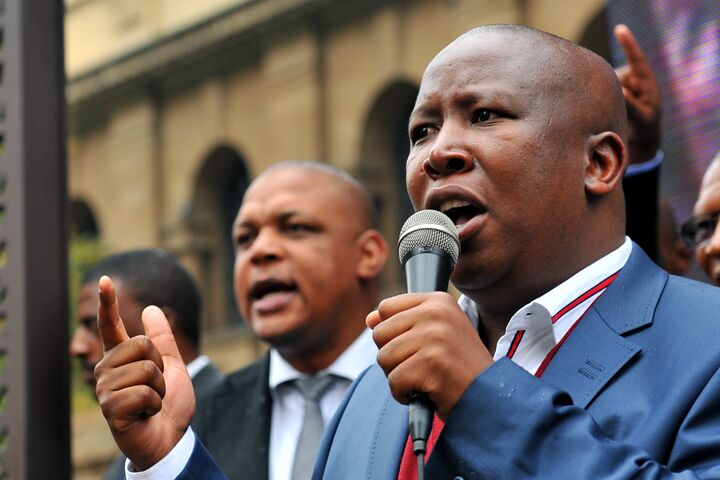
South Africa Primed for More Violence
South Africa could be on the verge of racial warfare as the firebrand youth leader of the African National Congress (anc) calls for the seizure of white-owned farms and the nationalization of white-owned businesses.
Julius Malema, 30, who was recently tried by South Africa’s Equality Court for singing a song that calls for the killing of Afrikaans farmers, has repeatedly called for the nationalization of the country’s mines and banks, which he says are controlled by whites. At an anc Youth League conference in Johannesburg in late June, Malema’s anger burned even hotter than usual. “The real enemy is white monopoly capital,” Malema told more than 5,000 cheering delegates. “They are the ones we are fighting against. In whose hands is this wealth? In whites!”
He elaborated further on his plans for South Africa by saying that these seizures must be made without compensation. “Our calls for mines to be nationalized and land to be expropriated without compensation is currently our most important issue,” he told delegates in a 90-minute speech.
“You can never be diplomatic about willing-buyer, willing-seller. It has failed. You have not come with an alternative,” said Mr. Malema, criticizing the government. “We are giving you an alternative; we must take the land without payment.”
Malema’s proposed policy, a policy of business and land seizures, has investors running scared. Even though anc leadership has stated that nationalization is not official policy, it is getting harder and harder to just dismiss Malema as a radical sideshow in South African politics. As unemployment soars, his views resonate with the 50 percent of young black South Africans who are out of work and whose living conditions have not improved in the 17 years since the end of apartheid.
While Malema may not be the king of South African politics, he could definitely be considered the primary king-maker. South African President Jacob Zuma relied heavily on the support of Julius Malema’s Youth League during the ouster of his predecessor—Thabo Mbeki. Since Zuma cannot risk having Malema throwing his support behind some other candidate, he is likely to forge a halfway compromise between the government’s current position and the more radical proposals proffered by the Youth League.
Malema’s economic policies have been compared to those of Zimbabwe’s president, Robert Mugabe. In 2000, Mugabe ordered the seizure of farms from whites without compensation, a policy that led to the collapse of the nation’s agriculture-based economy. Then, in 2008, Mugabe’s government passed a law to force both foreign- and white-owned mining companies to hand over 51 percent of their assets to black Zimbabweans.
Investors fear that the implementation of Malema’s economic policies will transform South Africa into a second Zimbabwe. More than this, however, many political observers believe the seizure of white-owned farms and businesses could spark clashes between whites and blacks.
“Malema is driving a real racial schism in the country,” Frans Cronje, deputy chief executive officer of the Johannesburg-based Institute for Race Relations, said in a June 28 interview. “It doesn’t take a majority of black South Africans in order to drag the country into a racial mess. It takes a few characters like Malema with the tacit consent of the anc.”
According to opposition leader Helen Zille, Malema “has, single-handedly, positioned the anc as a racial nationalist party, exclusive, uncompromising, insatiable in its lust for power and impervious to other ideas.”
As we wrote in “Outside the Stadium” in our July 2010 issue:
More white farmers were murdered in South Africa during just 2009 than have been killed in Zimbabwe since Robert Mugabe came to power. Since the end of apartheid, over 3,000 white farmers have been murdered, according to the bbc. South Africa’s News24, on the other hand, says “only” 1,600 farmers have been killed in approximately 10,000 farm attacks since 1991. Even if that figure were true, it would still make farming in South Africa one of the most dangerous professions in the world. White farmers are more than twice as likely to be killed as police officers, and far more likely to be killed than miners.
If violence and crime are this bad in South Africa now, imagine how bad things could get once the government starts seizing land and businesses from their rightful owners.
The biblical book of Ezekiel contains many end-time prophecies that apply to the modern-day nations of Israel—South Africa included. Ezekiel 7:23-27 perfectly describe the situation in South Africa today: “Make a chain: for the land is full of bloody crimes, and the city is full of violence. Wherefore I will bring the worst of the heathen, and they shall possess their houses ….” The Bible prophesies that so many bloody, violent crimes will occur that they will be like links in a chain—one right after another. This particular passage even talks about people’s homes being taken away.
For more information on the future of South Africa, read our booklet South Africa in Prophecy.
